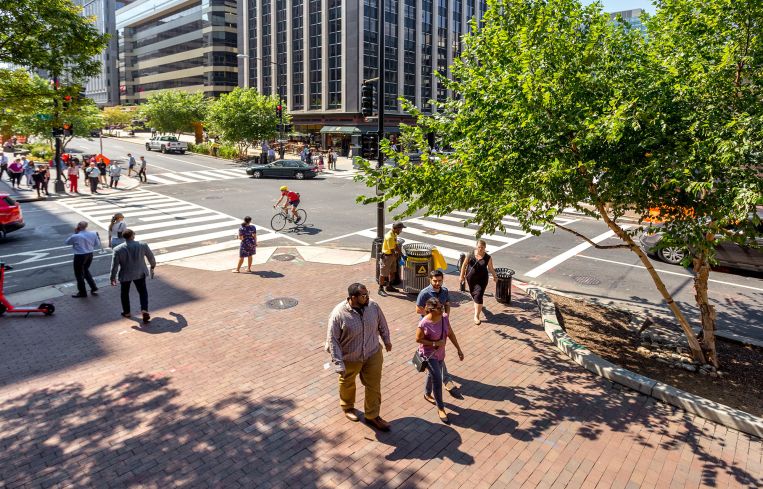DC’s ‘CBD of the Future’ Certified as LEED Platinum
The Golden Triangle in downtown DC lands the first LEED Platinum certification of its kind
By Keith Loria October 8, 2019 2:01 pm
reprints
The Golden Triangle Business Improvement District (BID) in downtown Washington, D.C., has become the first BID in the world to be designated as LEED Platinum, according to Lee Ford-Dwyer, who spearheaded the LEED certification process for the district.
Additionally, The Golden Triangle was the first to be named a LEED-certified community, according to a prepared statement.
“We wanted to recognize and highlight how the building owners in the Golden Triangle BID are really leading the way in increasing their energy efficiency and sustainability,” Ford-Dwyer told Commercial Observer, adding that “the BID itself has worked to increase sustainability.”
Originally formed in 1998, the 43-square-block BID, situated in D.C.’s central business district, stretches from the White House to Dupont Circle and is home to approximately 6,000 businesses. Overall, The Golden Triangle has 63 LEED-certified buildings.
“We’ve been working on a lot of projects that we are really proud of, including our rain gardens to make sustainability a main focus of what we do,” Mareike Finck, BID’s head of communications, told CO. “We already have six rain gardens and we’re working on a major initiative on 19th Street NW, where we are building 10 additional rain gardens and 10 expanded tree boxes between K and M Streets.”
To earn the LEED Platinum certification under the U.S. Green Building Council’s LEED for Communities rating system, the Golden Triangle recorded maximum scores in energy, water and transportation, registered high performance scores in both waste and human experience, and collected points for efforts such as its recycling program, homeless outreach and the installation of green infrastructure.
Over the past seven years, the BID has converted 12,000 square feet of asphalt and concrete into green space, per the statement. Last year, BID renovated Duke Ellington Park, redesigning it to include permeable pavers, a rain garden, a rainwater harvesting system and new landscaping.
“These green infrastructure practices prevent thousands of gallons of polluted storm water from reaching Rock Creek each year,” Ford-Dwyer said. “It’s all part of our strategic plan. Green infrastructure and sustainability are part of what we think of as an important component to position ourselves as the CBD of the future.”
Looking ahead, Finck said there are a number of projects within the BID that will help to continue the high sustainability scores, such as the redesign of Penn West — Pennsylvania Avenue west of the White House.
“The vision includes new green space, rain gardens, an expanded tree canopy and protected bike lanes,” she said. “We want to make it a more attractive place for bicyclists, visitors, pedestrians and tenants, and make it a more sustainable corridor.”
Update: This story originally misattributed source material. This has been corrected. We apologize for the error.



